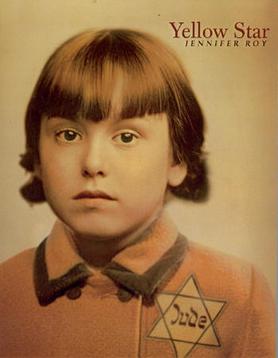Yellow Star (novel) facts for kids
 |
|
| Author | Jennifer Roy |
|---|---|
| Country | United States |
| Language | English |
| Genre | Historical fiction |
| Published | 2006 (Marshall Cavendish) |
| Media type | Print (hardback & paperback) |
| Pages | 227 pp. |
| ISBN | 978-0-7614-5277-5 |
| OCLC | 61162378 |
| LC Class | PZ7.R812185 Yel 2006 |
Yellow Star is a children's novel written by Jennifer Roy in 2006. It tells a true story through the eyes of a young Jewish girl named Syvia. Her family was forced to live in a special, walled-off area called the Łódź Ghetto during World War II.
The book is written in a special style called free verse. This means it uses short lines and poetic language, but it doesn't rhyme. Jennifer Roy wrote the book based on her aunt Syvia's real memories. Syvia shared her childhood experiences from the ghetto more than 50 years later. The story covers Syvia's life from age four and a half to ten while she was in the ghetto. Syvia, her older sister Dora, and her younger cousin Isaac were among only twelve children who survived. After the war, Syvia moved to the United States. The book has won many awards since it was published.
About the Book's Story
Yellow Star is based on the real memories of Sylvia Perlmutter Rozines. She was known as Syvia Perlmutter when she was a child. Syvia was only four and a half years old when she and her family were forced into the Łódź Ghetto in 1939. She lived there for over five years. The ghetto was finally freed just one day before her tenth birthday. This means more than half of her young life was spent inside the ghetto.
The book shares the events of those five and a half years. Sylvia recalled these difficult times many years later as an adult. The title, Yellow Star, comes from the yellow badge that Syvia and other Jewish people were forced to wear. This badge made them stand out.
How the Story Was Told
More than 50 years after the war, Sylvia Perlmutter Rozines began to share her story. She first told her son, who is Jennifer Roy's cousin. He then told Roy's sister, who told Jennifer Roy. Jennifer Roy recorded her conversations with Syvia. These recordings became the main source for the book.
Jennifer Roy chose to write Yellow Star in free verse. She wanted to share Syvia's experiences with children in a real and heartfelt way. She felt that free verse helped the story feel more genuine. Roy organized Syvia's memories into the correct time order. She also added short introductions to each chapter. These introductions explain what was happening in the war outside the ghetto. Even though the book is based on real memories, it is called historical fiction. This is because Jennifer Roy added some made-up conversations to the story.
What Happens in the Book
In 1939, the Nazis invaded Poland. They forced many Jewish people into one part of the city of Łódź. This area was later surrounded by walls and became known as the ghetto. Before the invasion, Syvia and her family lived in Łódź. When they heard rumors about the German invasion, they tried to escape to Warsaw. However, they could not find a new home or work there. So, they returned to Łódź.
When the Germans took over, Syvia's family and other Jewish people were forced to move into the ghetto. The book describes what life was like for Syvia inside the ghetto. It talks about her friends, the people she met, and her daily routine. Syvia's family even had to sell her favorite doll. She was left with only rags and buttons to play with.
The book also shares very sad events. When other Jewish children were taken away, Syvia's family tried to hide children by moving them from one cellar to another. One of Syvia's friends disappears, and another is killed. The ghetto was finally freed on January 19, 1945. This was just one day before Syvia's tenth birthday. Syvia, her older sister Dora, and her younger cousin Isaac were among only twelve children who survived the ghetto.
After the War
At the end of the book, there is a special section called "Author's Note." This part explains what happened to the people Syvia knew in the ghetto. It tells how the survivors in her family first moved to Paris, France. Later, Syvia moved to the United States. She changed her name to Sylvia. She married David Rozines, who also survived the Holocaust. They settled in New York.
As of 2006, Sylvia was living in Maryland. She was a volunteer at the United States Holocaust Memorial Museum in Washington, D.C. She also gave a video interview to the Shoah Foundation. This organization records the personal stories of people who survived the Holocaust.

